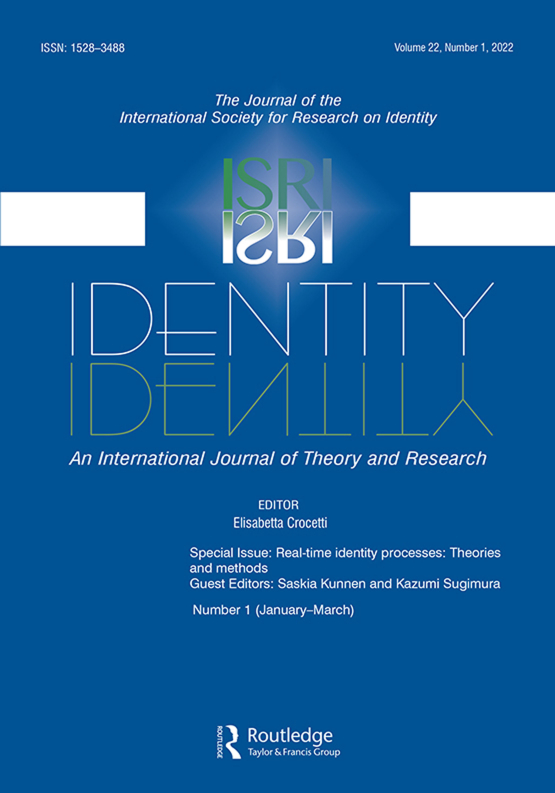Submit a Manuscript to the Journal
Identity
For a Special Issue on
Methods for Unraveling Identity: The Identity Researcher's Toolbox
Abstract deadline
Manuscript deadline

Special Issue Editor(s)
Elisabetta Crocetti,
University of Bologna, Italy
elisabetta.crocetti@unibo.it
Christin Camia,
Zayed University, United Arab Emirates
Christin.Camia@zu.ac.ae
Theo Klimstra,
Tufts University, US
Theo.Klimstra@tufts.edu
Joseph R. Schwab,
Bridgewater State University, US
jschwab@bridgew.edu
Methods for Unraveling Identity: The Identity Researcher's Toolbox
Identity: An International Journal of Theory and Research welcomes submissions for the special issue “Methods for Unraveling Identity: The Identity Researcher's Toolbox”.
Identity is a complex and multifaceted concept. To fully capture its richness, identity scholars tackle it through various lenses and perspectives. Accordingly, they can employ diverse quantitative, qualitative, and mixed-method approaches. Moreover, since identity is not static but evolves over time, a range of longitudinal designs can be utilized to uncover its developmental patterns.
This special issue aims to bring together contributions that focus on methodologies for studying identity. We welcome submissions of Methodological articles that:
a) introduce innovative methodologies for identity research;
b) compare the strengths and limitations of existing approaches;
c) provide tutorial-style guidelines for implementing state-of-the-art practices in identity research.
Methodological articles should be written to be accessible to a broad audience of scholars. See the Instruction for Authors for more info on this type of article.
Examples of articles suitable for the special issue include:
- From theory to measurement
- Identifying identity statuses and profiles: A tutorial on classification methods
- Designing longitudinal studies: From long-term to day-to-day approaches
- Conducting and coding narrative identity interviews: A step-by-step guide
- Participant-generated approaches to collecting qualitative identity data
- Longitudinal analytical approaches: A tutorial on cross-lagged panel models
- Designing and evaluating identity interventions: Methods for assessing effectiveness
- Reviewing, integrating, and advancing existing methodological approaches
These are just examples; we welcome submissions on other relevant topics. However, please note that studies focusing on the psychometric evaluation of instruments (e.g., validation studies assessing the psychometric properties of a scale developed in English when adapted to another language) are not the primary focus of this special issue. They can still be submitted but only as a Brief report as indicated in the journal Instructions for Instruction for Authors.
Submission Instructions
Timeline and Submission Process
May 15, 2025: Deadline for proposal submission. Interested authors can submit a proposal (maximum 700 words) that describes the paper they intend to submit. Proposals must be submitted to Identity through the Submission Portal (https://accounts.taylorfrancis.com/identity), accessible via the journal webpage by navigating to the ‘Submit a manuscript’ tab. Authors should complete the step-by-step submission process, indicating that their proposal is for the special issue “Identity Methods”
June 15, 2025: Guest Editors’ decision/feedback regarding invitations for full manuscript submission sent to authors.
November 15, 2025: Full manuscript submission deadline. Invited full manuscripts should be prepared in accordance with the journal’s author guidelines (Instruction for Authors) and submitted through the journal’s submission portal (https://accounts.taylorfrancis.com/identity). All submitted papers will undergo a regular peer review process. Each article will be handled by one of the guest editors who will send it out for blind peer review to two reviewers. An invitation to submit a full paper is, thus, not a guarantee of acceptance.
The Identity journal is indexed in the main databases (Scopus, Web of Science, PsychInfo, etc.). Its impact factor (IF) is 2.2 (2023; Journal citation reports), and its CiteScore (Scopus) is 4.2 (Q1 CiteScore Best Quartile; Scimago). The journal is hybrid, meaning that authors can publish their work open access, but they are not obligated to do so. For more info on the journal, please visit the journal website.

